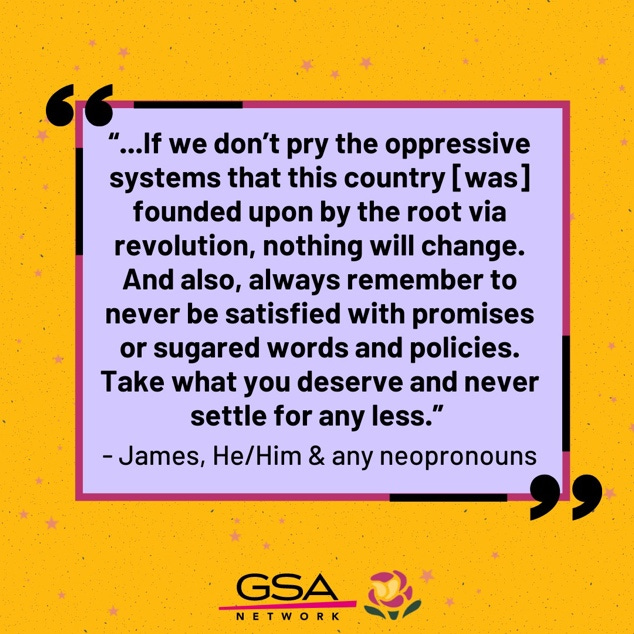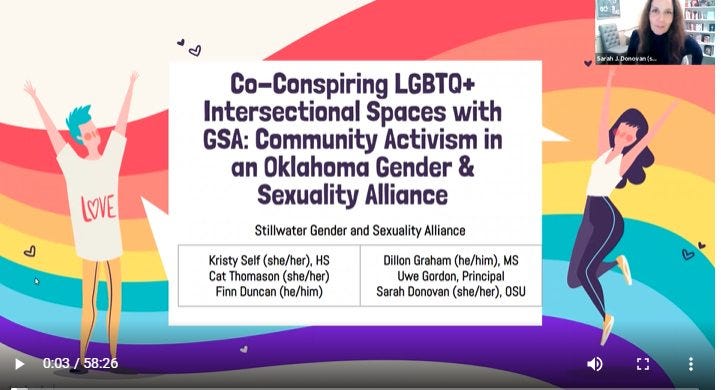OSU Pushes Radical Gender Theory Into Rural Areas
Part 4: How OSU officials push queer theory into rural areas and k-12 settings through research and outreach and by promoting LGBTQA+ literature for young children.
The previous segment highlighted how OSU transitioned from on-campus and adult-focused events and activities to queer theory that targets youth and children in settings beyond OSU’s campuses. The transition to child-focused queer theory occurred largely because of OSU’s fixation with DEI. This segment will continue the focus on Gender, Sex, and Sexuality Marxism at OSU and will provide specific examples of how OSU officials push queer theory into rural areas and k-12 settings.
Part 3 included information about a social media post shared and commented on by seven OSU faculty and administrators from the College of Education and Human Sciences. The post discussed LGBTQ-inclusive children's literature specifically the picturebook “Pride: The story of Harvey Milk and the rainbow flag” written by Rob Sanders. The book traces the history of the Pride flag since 1978 and tells the story of Harvey Milk the first openly gay man to be elected to a public office in California. The book was written for grade levels kindergarten to 3rd and is marketed for children ages 3 to 9 years old.
Many people describe Milk as a gay rights activist. Others describe him as a pederast and statutory rapist because of his relationships with underage boys, especially his long-term relationship with a 16-year-old runaway named Jack Galen McKinley.
Milk was known for leading a successful campaign against Proposition 6 (also known as the Briggs Initiative) in California. If the proposition had passed, schools would have been prohibited from hiring and required to dismiss:
“schoolteachers, teachers' aides, school administrators or counselors for advocating, soliciting, imposing, encouraging or promoting private or public sexual acts…between persons of same sex in a manner likely to come to the attention of other employees or students; or publicly and indiscreetly engaging in said acts.”
Ronald Reagan also opposed Proposition 6 and played a significant part in ensuring the initiative failed, and he did so at the risk of losing the support of his conservative base. The American Spectator published Reagan and Milk, an article about both men's opposition to Proposition 6.
Jenn Sanders is a faculty member (administrator at the time of the post) who commented on and shared the post about LGBTQ-inclusive children's literature. Sanders is currently a professor in the literacy education program and serves as the program coordinator for language, literature and culture program which focuses on “the ways in which language, literacy and culture are integrally linked in K-12 and adult teaching and learning contexts.” According to OSU’s website, faculty in the language, literature and culture program “examine the social, cultural and political constructions and institutions that affect language, literacy and culture education from various theoretical lenses and through diverse research methodologies.” Sanders also holds the Laurence L & Georgia Ina Dresser Professor in Rural Teacher Education Endowed Professorship and is co-founder of the Whippoorwill Award for Rural Young Adult Literature.
Three others (Shelbie Witte, Robin Fuxa, and Suzii Parsons) who engaged in the post currently hold positions in the reading and literacy program, teaching courses, and managing programs for preservice teachers. Witte is head of the School of Teaching, Learning and Educational Sciences, the Kim and Chuck Watson Chair in Education and Professor of Adolescent Literacy and English Education, Emeritus Director of the Oklahoma State University Writing Project, and Senior Director of Teacher Education at OSU. Parsons is an associate professor who teaches elementary education and literacy courses and directs the ExCEL program for OSU preservice elementary teachers. Fuxa was the Director of Professional Education at OSU and is currently an assistant professor in the School of Teaching, Learning and Educational Sciences.
In March of 2018, OSU hosted the Oklahoma State GSA Leadership Summit. GSA stands for Gay–Straight Alliance, Gender-Sexuality Alliance, or Queer–Straight Alliance (QSA). Both GSA and QSA are student-led or community-based clubs that focus on gender and sexuality. The clubs are typically found in middle schools, high schools, colleges, and universities across the United States and Canada. According to Wikipedia:
“Gay–straight alliance is intended to provide a safe and supportive environment for lesbian, gay, bisexual, transgender, and all (LGBTQ+) children, teenagers, and youth as well as their cisgender heterosexual allies.[1]In middle schools and high schools, GSAs are overseen by a responsible teacher. The first GSAs were established in the 1980s.”
According to the GSA Network:
“GSA Network is a next-generation LGBTQ racial and gender justice organization that empowers and trains queer, trans and allied youth leaders to advocate, organize, and mobilize an intersectional movement for safer schools and healthier communities.”
The GSA Network’s website states:
“Our overall strategy for fighting for educational justice is to work with grassroots, youth-led groups and GSAs, empowering them to educate their schools and communities, advocate for just policies that protect LGBTQ youth from harassment and violence, and organize in coalition with other youth groups across identity lines to address broader issues of oppression. All of our work with students focuses on leadership development and activism that prioritizes building alliances not only across sexual orientation and gender identity lines, but also across race, ethnicity, and class lines.”
The public can learn about Oklahoma’s Gay-Straight-Trans Alliance Network by visiting the Facebook group. The group page includes information for a Stray-Pups Entertainment event. People can visit the Stray-Pups Entertainment Facebook page to learn about events hosted in Oklahoma.
Other school-based sexuality and gender clubs include GLSEN and Rainbow Club. GLSEN focuses on k-12 education and provides programs that “support student and educator-led initiatives for change in schools. These include national Days of Action, organizing resources, and guidance around forming and sustaining clubs and GSAs. GLSEN also partners with supportive educators by offering lesson plans, professional development, trainings and more.”
Rainbow Clubs are the elementary school version of GSA and were created by two elementary school teachers who “are dedicated to equipping educators with the tools they need to foster safe, welcoming gender-inclusive classrooms.”
In 2019 a Stillwater high school GSA advisor Kristy Self and college LGBTQIA advisor Irissa Baxter presented at the Big 12 LGBTQIA & Allies Summit. Irissa Baxter was also the coordinator of OSU’s Women’s and LGBTQ Affairs within the Office of Multicultural Affairs at OSU. The presentation was titled “Building Relationships between Rural LGBTQIA High School Students and College Students.” According to the conference website the presentation provided attendees an opportunity to:
“learn about the obstacles facing rural LGBTQ students, and how they can be tackled. Created by high school GSA advisor Kristy Self and college LGBTQIA advisor Irissa Baxter, the Oklahoma State GSA Leadership Summit provides high schoolers a day of conversations with LGBTQIA leaders from across the state, presentations of key support structures and resources, and in-depth conversations with LGBTQIA college students.”
In 2021, Sarah Donovan a faculty member in the College of Education and Human Sciences, and four people from Stillwater Public Schools (Alison Black, Uwe Gordon, Dillon Graham, and Kristy Self) presented at an annual conventionhosted by the National Council of Teachers of English (NCTE). The presentation was titled “Co-Conspiring LGBTQ+ Intersectional Spaces with GSA: Community Activism in an Oklahoma Gay-Straight Alliance.” The presentation description, as listed in the convention program, is included below along with a Facebook post made by Sarah Donovan.
“Creating collaborative pathways that brings together a variety of stakeholders is key to developing inclusive classrooms and schools. Discover how literature helped this community start and continue conversations around equality, equity, and advocacy. Learn how to create a GSA Club in your schools and then cultivate intersectional safe and public spaces of activism.”
OSU’s DRAG Lab was introduced in a previous segment of this series and is an example of OSU’s efforts to push queer theory into rural areas including k-12 settings. The DRAG Lab is a research collaborative in the School of Community Health Sciences, Counseling, and Counseling Psychology. The mission of the DRAG Lab is to promote:
“knowledge about the unique experiences of sexual orientation gender identity (SOGI) in rural, remote and geographically diverse areas of the United States and of the world. To this end, we explore interactions and/or relationships between identity, location and health. We advocate for SOGI populations based on our findings.”
According to OSU’s website, The DRAG Lab’s guiding principles include an approach that is:
“holistic, humanistic and feminist and focuses on empowering SOGI people and communities. We engage in reflexivity; we explore our own positions of privilege as we promote the understanding of intersectionality, and we recognize our power in knowledge creation. We approach our research in an interdisciplinary manner and hold ourselves accountable to the communities and larger systems in which we function. Our research is tied to the greater goals of addressing cissexism, heterosexism, classism, racism, ableism and other forms of oppression. Thus, our work includes a critical consciousness perspective of our own findings and of existing research findings and models.”
In 2021, the Oklahoma Department of Mental Health and Substance Abuse Services tweeted a “Thank you” to the director of The DRAG Lab for his presentation “celebrating LGBTQ+ resilience!” in which he stated, “Drag is a wonderful symbol of creativity leading to better health.”
In May 2022, Dean Jon Pedersen shared a post from The DRAG Lab to recognize the work of a OSU student and “DRAG affiliate” for the APA Division 56. In June 2022, Dean Pedersen shared on social media a video of Dr. Knutson speaking to News On 6 about LGBTQ+, Pride and Knutson’s experience as a student and now a faculty member at OSU.
This section provided a few specific examples of how OSU officials intentionally push queer theory into rural areas and k-12 settings through research and outreach and by promoting LGBTQA+ literature for young children. The next segment of this series will continue to focus on Gender, Sex, and Sexuality Marxism at OSU and will show how queer activists are undermining and belittling parents and advocating for limiting parental rights.








